小学常用介词讲解及练习
小学四年级英语介词练习

小学四年级英语介词练习介词的概念介词是连接名词、代词或动词与其他词语的一种成分。
它可以用来表示时间、地点、方向、原因、目的等多种关系。
常见的介词以下是一些常见的介词及其用法:1.in:表示在某个时间、地点、状态或具体范围内。
如:in the morning(在早上)、in the park(在公园)、in trouble(陷入麻烦)。
2.on:表示在某个具体的表面或时间上。
如:on the table(在桌子上)、___(在星期一)。
3.at:表示在某个具体的时间、地点或位置上。
如:at 8 o'clock (在8点钟)、___(在学校)、___(在街角)。
4.to:表示向某个地方或目标。
如:go to school(去学校)、give it to me(给我)。
5.with:表示带有某种特征、伴随或附加动作。
如:play with friends(和朋友一起玩)、write with a pen(用钢笔写)。
6.by:表示运输方式、手段或经由某个途径。
如:go by bus (坐公交车去)、send it by email(通过电子邮件发送)。
练题请仔细阅读以下句子,选择合适的介词填入括号中。
1.We usually have lunch __________ 12 o'clock.(in。
on。
at)2.The cat is sleeping __________ the sofa.(on。
in。
at)3.He lives __________ a big house.(in。
on。
at)4.I'm going __________ the park.(in。
on。
to)5.She always goes shopping __________ her mother.(with。
by。
to)参考答案1.at2.on3.in4.to5.with希望以上练习能够帮助你更好地掌握英语介词的使用。
小学英语语法专项讲解:介词

小学英语语法专项讲解:介词
一、介词的分类
地点(位置、范围)介词:in 在里面,on在上,in front of 在前方,under 是下方,两者之间用between ,behind 后面藏,next to 在隔壁,near 在附近与一旁,同学们用心记,各种方位用恰当。
时间介词: , at在… (时刻), in在(上/下午); on在(某日),
方式介词: by用/由/乘坐/被..., on骑(车)/徒(步), with用(材料),用(手/脚/耳/眼),
二、某些介词的用法辨析:
⑴ 时间或地点介词in、on、at的用法区别:表示时间时, in表示在一段时间里(在将来时句子中则表示在一段时间之后), on表示在具体的某一天或者某天的上下午等, at表示在某个时刻或者瞬间;
表示地点时, in表示在某个范围之内, on表示在某个平面上或与一个面相接触,at则表示在某个具体的场所或地点。
三、 Preposition:
on, in ,in front of, between, next to, near, beside, at, behind.
表示时间:at six o’clock, at Christmas, at breakfast
on Monday on 15th July On National Day
in the evening in December in winter。
(完整版)小学英语常用介词及用法
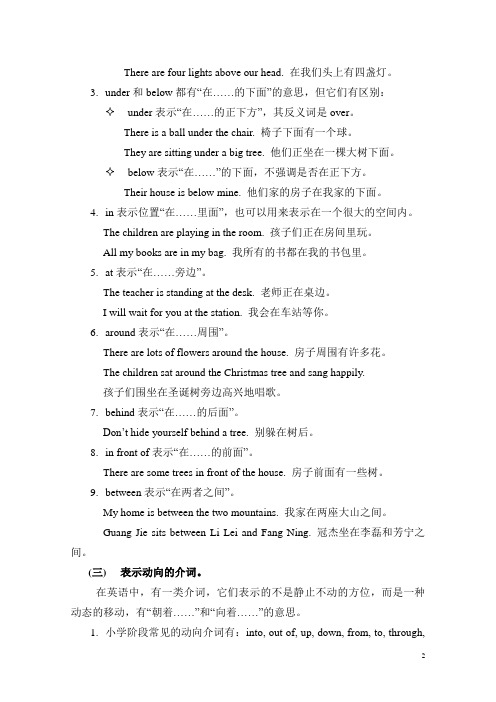
常见介词及用法(一)表示时间的介词1.英语里最常见的时间介词有:at, in, on, before, after和from。
2.at , in和on这三个词都表示时间。
✧at主要指具体的钟点:at half past eight 在八点半✧in一般指某一段时间:in January 在一月份✧on指具体在某一天:on Monday 在星期一3.before和after表示时间的先后顺序。
✧before表示“在……之前”。
You should wash your hands before eating. 吃饭前你应该洗手。
✧after表示“在……之后”。
They often play basketball after dinner. 他们放学后经常打篮球。
4.from作时间介词含有“从……开始”的意思,常和to连用,组成“from…to…”的结构,表示“从……到……”的意思。
We go to school from Monday to Friday. 我们从周一到周五上学。
(二)表示方位的介词,也就是表示位置和地点的介词。
1.小学阶段常见的方位介词有:on, in, at, under, over, above, below, about,around, between等。
2.on, over和above这三个词都有“在……上面”的意思,但它们所表示的方位还是有些不同。
✧on表示两个物体的表面相互接触。
如:There is a book on the desk. 桌上有一本书。
The boy is sleeping on the desk. 那个孩子睡在地上。
✧over表示“在……的正上方”,两个物体表面没有接触。
如:There is a light bulb over my head. 在我头顶上有一个灯泡。
✧above表示两个物体中一个在另一个的上方,如:The plane is flying above the clouds. 飞机上云层上飞行。
三年级语文上册(介词专项复习)
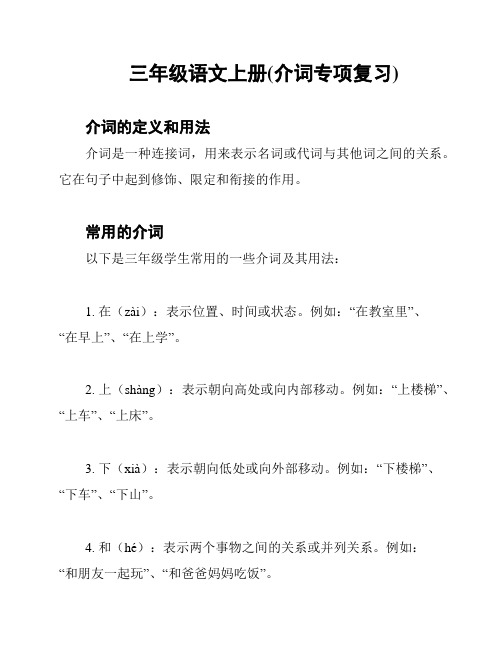
三年级语文上册(介词专项复习)介词的定义和用法介词是一种连接词,用来表示名词或代词与其他词之间的关系。
它在句子中起到修饰、限定和衔接的作用。
常用的介词以下是三年级学生常用的一些介词及其用法:1. 在(zài):表示位置、时间或状态。
例如:“在教室里”、“在早上”、“在上学”。
2. 上(shàng):表示朝向高处或向内部移动。
例如:“上楼梯”、“上车”、“上床”。
3. 下(xià):表示朝向低处或向外部移动。
例如:“下楼梯”、“下车”、“下山”。
4. 和(hé):表示两个事物之间的关系或并列关系。
例如:“和朋友一起玩”、“和爸爸妈妈吃饭”。
5. 对(duì):表示方向、目标或对象。
例如:“对准目标”、“对他说话”、“对我的问题回答”。
介词的注意事项在使用介词时,需要注意以下几点:1. 运用场景:要根据具体的语境和场景选择合适的介词。
2. 固定搭配:有些介词和动词、名词、形容词等有固定的搭配关系,需要记住这些固定搭配的用法。
3. 多义词:一些介词有多个意思,需要根据语境来确定其具体含义。
例句练以下是一些例句,供同学们进行练:1. 我们在教室里研究。
2. 妈妈对我笑了一下。
3. 小明上学要走很长时间。
4. 弟弟下楼梯的时候摔了一跤。
5. 我和朋友一起去公园玩。
希望同学们通过这次介词专项复,能够更加熟练地运用介词,提升语文表达能力。
请同学们做一些相关的练题来巩固所学知识。
(以上内容仅供参考,具体内容以教材为准。
)。
(完整版)小学常见介词用法辨析及习题

(完整版)⼩学常见介词⽤法辨析及习题⼩学常见介词⽤法辨析⼀、介词的定义及分类介词是⼀种⽤来表⽰词与词、词与句之间的关系的虚词,,在句中不能单独作句⼦成分。
介词后⾯⼀般有名词、代词或相当于名词的其他词类,短语或从句作它的宾语。
按构成分为简单介词(in、on、at等)、合成介词(into、within等)、重叠介词(at about等)、短语介词(in front of等)。
⼆、⼩学常⽤介词⽤法释义(⼀)表时间1、常⽤词in、on、at。
In:①+年份/世纪。
in 2019(在2019年);In the1990s(在19世纪90年代).①+⽉份。
In May(在五⽉).①+季节。
In spring/summer/autumn/winter(在春/夏/秋/冬季).①+⼀天的某个时间段(上午、下午、晚上等)。
In the morning/afternoon/eveningat :①+时刻、⼏点。
at six(在6点)/~half past ten(在10点半)①+年龄。
at thirteen/~the age of thirteen(在13岁时)①+某个时段at noon(在中午),at night(在晚上), at midnight(在午夜),at dawn(在黎明)on :①+星期⼏。
on Wednesday/Sunday(在星期三/在星期⽇)①+⽇期。
On June 4th =on the fourth of June (在六⽉4⽇)①+有day的节⽇。
On Christmas Day/Teacher’s Day(在圣诞节/教师节)①+具体某⼀天。
On a cold day(在⼀个寒冷的⼀天)、on Sunday afternoon(在星期⽇下午)2、其他常⽤词Before:在...之前after:在...之后since:⾃从...开始for +⼀段时间until:直到...时候from...to:从...到...(⼆)表⽅位1、常⽤词in、on、at。
小学方位介词讲义与习题(全面)
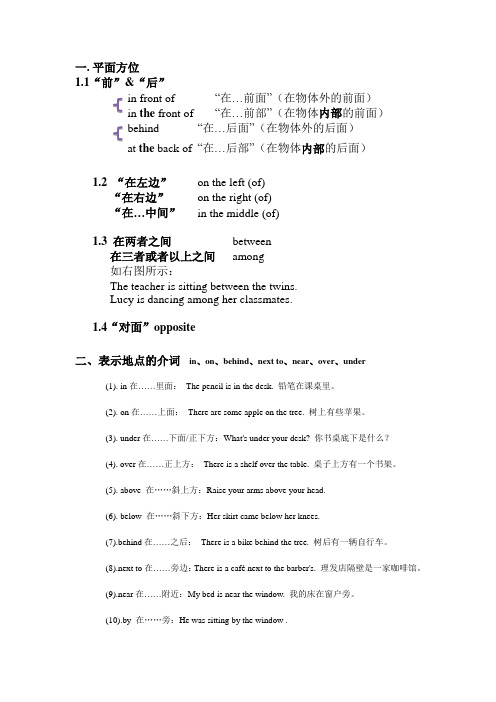
一. 平面方位1.1“前”&“后”in front of “在…前面”(在物体外的前面)in the front of “在…前部”(在物体内部的前面)behind “在…后面”(在物体外的后面)at the back of “在…后部”(在物体内部的后面)1.2 “在左边”on the left (of)“在右边”on the right (of)“在…中间”in the middle (of)1.3 在两者之间between在三者或者以上之间among如右图所示:The teacher is sitting between the twins.Lucy is dancing among her classmates.1.4“对面”opposite二、表示地点的介词in、on、behind、next to、near、over、under(1). in在……里面:The pencil is in the desk. 铅笔在课桌里。
(2). on在……上面:There are some apple on the tree. 树上有些苹果。
(3). under在……下面/正下方:What's under your desk? 你书桌底下是什么?(4). over在……正上方:There is a shelf over the table. 桌子上方有一个书架。
(5). above 在……斜上方:Raise your arms above your head.(6). below 在……斜下方:Her skirt came below her knees.(7).behind在……之后:There is a bike behind the tree. 树后有一辆自行车。
(8).next to在……旁边:There is a café next to the barber's. 理发店隔壁是一家咖啡馆。
小学英语常用介词用法详解及练习

小学英语常用介词用法详解及练习介词在句子中表示名词或代词等与其他词之间的关系。
不能单独作句子成分,常位于名词或代词(或与之相当的他词类、短语、从句)前面构成介词短语。
介词后面的成分作介词的宾语。
介词,是表示两词之间的关系的词。
我们在小学英语中学习的英语介词有:一、时间介词• 1.on( 1 ) 在------上面 The book is on the desk.( 2 ) 在------(哪一天/星期)What do you do on Wednesday?( 3 ) 在------(月、日)My birthday is on August 2nd.• 2.in(1)在------里面 The pens are in the pencil-box.(2)在------(哪一年/月)His birthday is in October. He wor ked here in 1992.(3)在------(地方) He works in Dongguan.•(4)在------之内 What are you going to do in 20 years?•(5)在------(早上、下午、晚上)I do morning exercises in the morning every day.I usually play basketball in the afternoon.I often do my homework in the evening.• 3.at(1)在------(点钟)I usually go to school at 8:00 am.(2)在中午 at noon二、方位介词• 1. under 在------底下 There is a ball under the bed.• 2. near 在------附近 There is a book shop near ourschool.• 3. in front of在------前面A boy is standing in front of the house.• 4. beside 在------旁边 A football is beside thedoor.• 5. next to 紧挨着 There is a bus station next to No. 13 Middle School.• 6. over 在------正上方 A bridge is over the river.•7. on the left在------左边 The bookstore is on the left.•8. on the right在------右边The hospital is on the right.•9. before在……之前 Mike sits before me.•10. after在------以后 He went home after school.•11. in the middle在------中间The road is in the middle.•12. at(1)在------(小地方) I am at school today.I was at home yesterday.(2)看一看 Look at the blackboard.•13. behind 在------后面There is a broom behind the door.。
小学英语介词的用法及专项练习

小学英语介词的用法及专项练习介词的定义和作用介词是英语中一类重要的词性,用于连接名词、代词、动词或者其他介词与其他成分之间的关系。
介词可以表达方向、位置、原因、时间等等。
常见的英语介词有:in, on, at, for, with, by, from, to, over, under 等。
介词的用法1. 表示地点表示地点- in: 在某个区域或范围内- The cat is in the box.(猫在盒子里。
)- on: 在某个平面或表面上- The book is on the table.(书在桌子上。
)- at: 在某个具体的位置- She is waiting at the bus stop.(她在公交车站等待。
)2. 表示时间表示时间- at: 表示具体的时间点- The meeting starts at 9 o'clock.(会议在9点开始。
)- on: 表示某一天或日期- I have an appointment on Monday.(我在星期一有个约会。
)- in: 表示一段时间内- They will go on vacation in July.(他们将在七月份去度假。
)3. 表示原因表示原因- for: 表示目的或理由- We go to the park for a picnic.(我们去公园野餐。
)4. 表示方式表示方式- with: 表示伴随或使用- She writes with a pen.(她用钢笔写字。
)5. 表示运动表示运动- from...to: 表示由某个地方到另一个地方- He walked from home to the school.(他从家里走到学校。
)介词练请根据句子的意思,选择适当的介词填空。
1. The dog is __ the yard.(狗在院子里。
)2. My birthday is __ Sunday.(我的生日在星期天。
小学英语介词整理(循序渐进地讲解和练习)
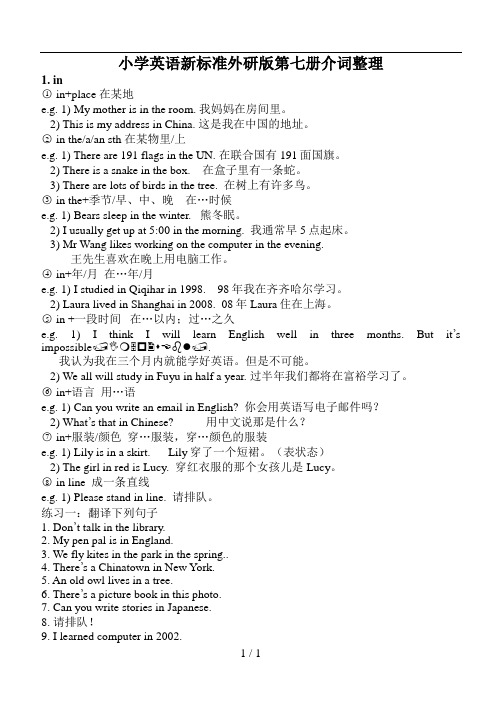
小学英语新标准外研版第七册介词整理1. in○1 in+place 在某地e.g. 1) My mother is in the room. 我妈妈在房间里。
2) This is my address in China. 这是我在中国的地址。
○2 in the/a/an sth 在某物里/上e.g. 1) There are 191 flags in the UN. 在联合国有191面国旗。
2) There is a snake in the box. 在盒子里有一条蛇。
3) There are lots of birds in the tree. 在树上有许多鸟。
○3 in the+季节/早、中、晚在…时候e.g. 1) Bears sleep in the winter. 熊冬眠。
2) I usually get up at 5:00 in the morning. 我通常早5点起床。
3) Mr Wang likes working on the computer in the evening.王先生喜欢在晚上用电脑工作。
○4 in+年/月在…年/月e.g. 1) I studied in Qiqihar in 1998. 98年我在齐齐哈尔学习。
2) Laura lived in Shanghai in 2008. 08年Laura住在上海。
○5 in +一段时间在…以内;过…之久e.g. 1) I think I will learn English well in three months. But it’s impossible .我认为我在三个月内就能学好英语。
但是不可能。
2) We all will study in Fuyu in half a year. 过半年我们都将在富裕学习了。
○6 in+语言用…语e.g. 1) Can you write an email in English? 你会用英语写电子邮件吗?2) What’s that in Chinese? 用中文说那是什么?○7 in+服装/颜色穿…服装,穿…颜色的服装e.g. 1) Lily is in a skirt. Lily穿了一个短裙。
【优质讲义】小学英语语法归纳训练讲义-12 介词in,on,at 全国通用版(含答案)

语法——介词in on atPart 1:学问点一、介词:是一种虚词,在句子中表示名词或代词与其他词之间的关系,不能单独做为句子成分,常位于名词或代词前面构成介词短语。
二、具体用法:常用介词1.in(1)表示方位:在……里面例句:There are three books in my bag.我书包里有三本书。
(2)表示地点:A.表示在大地方例句:I live in Hangzhou.我住在杭州。
B.表示属于该范围例句:Hei Longji ang lies in the north of China.黑龙江在中国北部。
(3)表示时间:A.表示一段时间(比较长)例:in summer在夏天in 2021在2021年in February 在二月B.表示在早上、下午、晚上例:in the morning/afternoon/evening(4)表示使用某种材料、语言等:例句:I can sing the song in English.我能用英语唱这首歌。
2.on(1)表示地点:在……上面例句:There is an apple on the desk.桌子上有一本书。
(2)表示时间:A.表示在具体某一天的上午、下午或晚上例:on June thirteenth在六月13日on the morning of May 1st在五月一日的早上B.表示在星期几的上午、下午或晚上例:on Friday在周五on Saturday afternoon在周六的下午2.at(1)表示在小地点:例:at school /home(2)表示时间点:例:at seven在七点at night在夜晚Part 2:练习一、用介词填空。
1.My mother begins to work ______ 8:00 ______ t he morning.2.Do you stay ______ home ______ weekend?3.They live ______ a new house now.4.Xinjiang is ______ the west of China.5.Lily usually have breakfast ______ the morning.6.They often have lunch ______ half past twelve.7.What’s this ______ English?8.There is a big gym ______ my school.9.She came to this city ______ 2020.10.It often snows here ______ winter.11.I will be back ______ a month.12.Don’t watch TV too much ______ the evening.13.Sally was born ______ May 11th.14.We don’t go to school ______ Saturday and S unday.15.They were happy ______ that time.16.______ the age of ten, I began to learn English.17.What do you often do ______ noon?18.______ a cold winter morning, I met her in the street.19.Mrs. Green came to Beijing ______ 2005.20.Children wake up very early ______ the morning ofChristmas Day.答案:1.at in2.at on3.in4.in5.in6.at7.in8.in9.in 10.i n 11.in 12.in 13.on 14.on 15.at 16.At 17.at 18.On 19.in 20.on。
小学六年级英语介词知识点及练习题
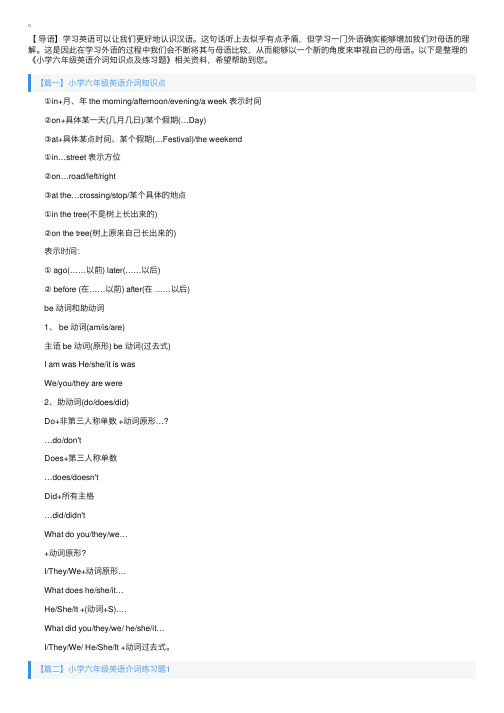
【导语】学习英语可以让我们更好地认识汉语。
这句话听上去似乎有点⽭盾,但学习⼀门外语确实能够增加我们对母语的理解。
这是因此在学习外语的过程中我们会不断将其与母语⽐较,从⽽能够以⼀个新的⾓度来审视⾃⼰的母语。
以下是整理的《⼩学六年级英语介词知识点及练习题》相关资料,希望帮助到您。
【篇⼀】⼩学六年级英语介词知识点 ①in+⽉、年 the morning/afternoon/evening/a week 表⽰时间 ②on+具体某⼀天(⼏⽉⼏⽇)/某个假期(…Day) ③at+具体某点时间、某个假期(…Festival)/the weekend ①in…street 表⽰⽅位 ②on…road/left/right ③at the…crossing/stop/某个具体的地点 ①in the tree(不是树上长出来的) ②on the tree(树上原来⾃⼰长出来的) 表⽰时间: ① ago(……以前) later(……以后) ② before (在……以前) after(在 ……以后) be 动词和助动词 1、 be 动词(am/is/are) 主语 be 动词(原形) be 动词(过去式) I am was He/she/it is was We/you/they are were 2、助动词(do/does/did) Do+⾮第三⼈称单数 +动词原形…? …do/don't Does+第三⼈称单数 …does/doesn't Did+所有主格 …did/didn't What do you/they/we… +动词原形? I/They/We+动词原形… What does he/she/it… He/She/It +(动词+S)…. What did you/they/we/ he/she/it… I/They/We/ He/She/It +动词过去式。
【篇⼆】⼩学六年级英语介词练习题1 ( ) 1. Why did you get up so early ___ this morning.A. onB. /C. atD. in ( ) 2. He went to Shanghai___ September 3, 1991 and came back___ a cold morning last year.A. in; onB. on; inC. on; onD. in; ia ( ) 3. Lucy was born____ the night of May 12, 1984.A. onB. inC. atD. to ( ) 4. Mrs Brown came to China ____ 1996.A.onB. ofC. toD. in ( ) 5 ___ the morning of November 20, 1915, the workers came to Chicago to show their mourning of Joe Hill.A. OnB. InC. OnD. At ( ) 6. Ann moved___Hangzhou___September, 1992.A. /; inB. to; inC. to; on D, in; in ( ) 7. They started off___an autumn afternoon.A. duringB. atC. inD. on ( ) 8. He often goes ____ school ____ six thirty ____ the morning.A. for; to; inB. to; at; inC. to; for; at D, for; at; to ( ) 9. He arrived ___ Shanghai ___ 9: 30 ___ March 5.A. at; in; atB. to; on; atC. in; on; atD. in; at; on ( ) 10.The English teacher told me to get there____ half past ten.A. inB. atC. onD. of 参考答案: B C A D B A D B D B【篇三】⼩学六年级英语介词练习题2 ( ) 1. Children get gifts ____ Christmas and ____ their birthdays.A. on; onB. at; onC. in; inD. in; on ( ) 2.----There is nothing ____tomorrow afternoon, is there? -----No. We can have a game of table tennis.A. onB. inC. outD. up ( ) 3. A lot of students in our school were born____March, 1981.A. inB. atC. onD. since ( ) 4. He suddenly returned____ a rainy night.A. onB. atC. inD. during ( ) 5. My grandfather was born____Oct. 10, 1935.A. onB. inC. atD. of ( ) 6. The train is starting___five minutes.A. inB. atC. forD.still ( ) 7. Mike does his exercises ____ seven _____ the evening.A. on; toB. at; inC. by; ofD. at; on ( ) 8. Children wake up very early____the morning of Christmas Day.A. inB. onC. forD. at ( ) 9 ____ a cold winter morning, I met her in the stfeet.A. InB. OnC. AtD. For ( ) 10 It happened to be very cold____ the morning of our sports meeting.A. atB. onC. withD. of 参考答案:B A A A A A B B B B。
小学英语语法——介词知识点讲解+练习
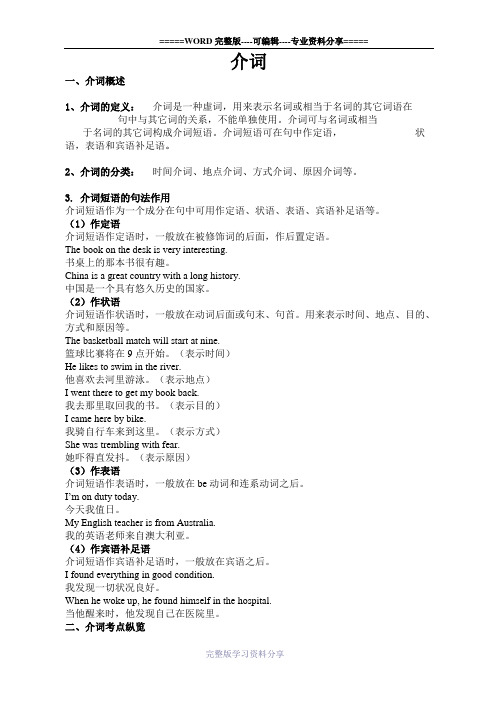
介词一、介词概述1、介词的定义:介词是一种虚词,用来表示名词或相当于名词的其它词语在句中与其它词的关系,不能单独使用。
介词可与名词或相当于名词的其它词构成介词短语。
介词短语可在句中作定语,状语,表语和宾语补足语。
2、介词的分类:时间介词、地点介词、方式介词、原因介词等。
3. 介词短语的句法作用介词短语作为一个成分在句中可用作定语、状语、表语、宾语补足语等。
(1)作定语介词短语作定语时,一般放在被修饰词的后面,作后置定语。
The book on the desk is very interesting.书桌上的那本书很有趣。
China is a great country with a long history.中国是一个具有悠久历史的国家。
(2)作状语介词短语作状语时,一般放在动词后面或句末、句首。
用来表示时间、地点、目的、方式和原因等。
The basketball match will start at nine.篮球比赛将在9点开始。
(表示时间)He likes to swim in the river.他喜欢去河里游泳。
(表示地点)I went there to get my book back.我去那里取回我的书。
(表示目的)I came here by bike.我骑自行车来到这里。
(表示方式)She was trembling with fear.她吓得直发抖。
(表示原因)(3)作表语介词短语作表语时,一般放在be动词和连系动词之后。
I’m on duty today.今天我值日。
My English teacher is from Australia.我的英语老师来自澳大利亚。
(4)作宾语补足语介词短语作宾语补足语时,一般放在宾语之后。
I found everything in good condition.我发现一切状况良好。
When he woke up, he found himself in the hospital.当他醒来时,他发现自己在医院里。
小学英语常考介词

小学英语常考介词介词一般置于名词之前,它常和名词或名词性词语构成介词短语。
同一个介词和不同的词语搭配形成固定搭配,表示不同的意义。
一、常考时间介词at,on,in时间介词at,on,in后面都可以接表示时间的词,但用法又有所不同。
1、时间介词at的用法:(1)at+具体时刻/时间点。
如:at six o'clock ;at a quarter to eight ;at half past nine(2)at+某个时段。
如:at noon/night ;at weekends(3)at+节日。
如:at Christmas(4)at+年龄。
如:at ten/at the age of ten例:Peter usually gets up at 7 o'clock in the morning.PeterThe clock strikes twelve times at noon.We'll see you at Christmas.She left her hometown at fourteen.(1)on+星期。
如:on Monday ;on Friday(2)on+具体日期。
如:on May 21st(3)on+具体某天的上午/下午/晚上。
如:on Saturday evening on the morning of May 21st例:We have an English class on Thursday.Mike's birthday is on March 9th.They will have a football game on the afternoon of April 11th.3、时间介词in的用法:(1)in+上午/下午/晚上。
如:in the morning/afternoon/evening(2)in+月份、季节、年份。
如:in October ;in spring ;in 2015(3)in+年龄。
小学六年级介词的常见用法归纳与解析

小学六年级介词的常见用法归纳与解析介词是英语中一种非常重要且常用的词类,它用来连接名词、代词、动词、形容词和副词等,起到表示位置、方向、时间、原因等等的作用。
在小学六年级的学习中,理解和正确运用介词是非常关键的。
本文将介绍小学六年级常见的介词用法以及对其进行分析和解析。
一、表示位置和方向的介词1. in介词"in"表示在某个范围、区域内,常用来指示地点或位置。
例如:in the classroom(在教室里)、in the park(在公园里)2. on介词"on"用来表示在某个表面或较大的平面上。
例如:on the table(在桌子上)、on the floor(在地板上)3. at介词"at"用来表示确切的位置或地点,通常用在某个建筑物或公共场所名称之后。
例如:at the bus stop(在公交车站)、at the library(在图书馆)4. into介词"into"表示进入某个地点或物体。
例如:jump into the water(跳进水中)、walk into the house(走进房子)5. out of介词"out of"表示从某个地方或物体出来。
例如:get out of the car(从车里出来)、take the book out of the bag (把书从包里拿出来)二、表示时间的介词1. at介词"at"用来指示具体的时间点。
例如:at 7 o'clock(在7点钟)、at noon(在中午)2. on介词"on"用来指示具体的日期或星期几。
例如:on Monday(在星期一)、on May 1st(在5月1日)3. in介词"in"用来指示一个时间段或某个月、季节、年代。
例如:in the morning(在早上)、in winter(在冬天)三、表示原因和目的的介词1. for介词"for"表示为了某个目的或原因。
中小学语法大全之介词及专项练习题--答案

专题十二介词的用法教学目标:1、掌握常考介词on,in,at和for的用法;2、理解并运用between…and, from…to等介词短语.重点难点:1、重点:常考介词on,in,at和for的用法;2、难点:一词(介词)多义(如with)。
介词的用法:1、without :没有,不,在。
.。
之外We can’t do it better without your help.没有你的帮助,我们就做不好。
We couldn't live without air and water.没有空气和水,我们就不能生存。
2、between…and :在.。
.两者之间He sits between you and me.他坐在你我之间。
3、for:为。
.。
, 因为.。
.,至于。
.He works for this company.他为这家公司工作。
She came back to the classroom for she had left her books in the classroom. 她返回到教室是因为把书留在了那里.4、from:从。
,来自.。
., 因为。
.。
Where are you from?你是哪里人?5、in:在..., 在。
.之内,从事于。
., 按照。
.。
, 穿着。
He was born in 1992.他生于1992年。
The man in black jacket is our teacher。
穿黑夹克的那个人是我们的老师.6、like:像。
.,如同...The twins are like their father.双胞胎像他们的父亲.7、near:靠近。
.。
There are some flowers near the house。
房子附近有一些花。
8、of ..。
:的,属于。
..This is a map of China。
这是一张中国地图。
●●● at:表示时间的一点;in:表示一个时期;on:表示特殊日子。
小升初英语介词知识详解及习题(含答案)

介词(基础篇)1考点一:方位介词方位介词是表示位置和方向的介词.常用的方位介词有on,over,above,under, below,in,at,about,around,behind,between,among,beside,near等.1.on,over和above的用法on,over和above都有“在…上面”的意思,但这三个调在意义上还是有一些区别的。
(1)on表示两个物体的表面相互接触,例如:There is a plant on the desk.书桌上有一株植物。
(植物紧贴着桌面)(2)over表示“在…的正上方”,两个物体表面没有接触,侧如:A lamp hung over the table.桌子上方挂着一盏灯。
(灯和桌面没有接触)(3)above表示一个物体在另一个的上方,但不一定是在正上方,两个物体之间没有接触。
例如:Look!A lot of birds are flying above the trees.看!许多鸟正在树的上空飞。
2.under和below的用法under和below都有“在…下面”的意思,不过这两个词也是有区别的.(1)under表示“在…的正下方”。
例如:There is a cat under the table.桌子下面有一只猫。
(2)below表示"在…的下面",但不强测是否在正下方,例如:Our classroom is below theirs.我们的教室在他们(教室)的下面。
介词(基础篇)2 3.in的用法in表示"在…里面",也可以用来表示在一个很大的空间内。
例如:There are some books in the box箱子里有一些书。
4.at,about和around的用法at表示"在…旁边",about或around表示"在…周围"。
(1)at表示在某物旁边。
小学四年级常用介词总结与句型练习
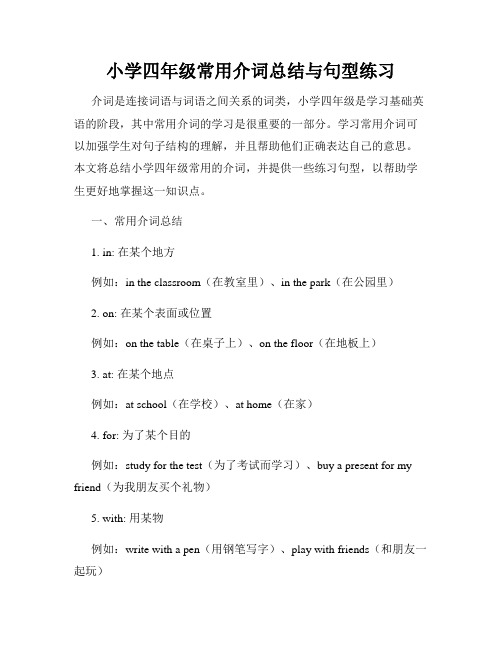
小学四年级常用介词总结与句型练习介词是连接词语与词语之间关系的词类,小学四年级是学习基础英语的阶段,其中常用介词的学习是很重要的一部分。
学习常用介词可以加强学生对句子结构的理解,并且帮助他们正确表达自己的意思。
本文将总结小学四年级常用的介词,并提供一些练习句型,以帮助学生更好地掌握这一知识点。
一、常用介词总结1. in: 在某个地方例如:in the classroom(在教室里)、in the park(在公园里)2. on: 在某个表面或位置例如:on the table(在桌子上)、on the floor(在地板上)3. at: 在某个地点例如:at school(在学校)、at home(在家)4. for: 为了某个目的例如:study for the test(为了考试而学习)、buy a present for my friend(为我朋友买个礼物)5. with: 用某物例如:write with a pen(用钢笔写字)、play with friends(和朋友一起玩)6. to: 去某个地方例如:go to school(去学校)、send a letter to my grandma(给我奶奶寄信)7. from: 来自某个地方例如:come from China(来自中国)、receive a gift from my teacher (从老师那里收到礼物)8. by: 通过某种方式或工具例如:travel by plane(乘飞机旅行)、write by hand(手写)二、句型练习1. 选择合适的介词填空:a) The book is _______ the table.b) I go to school _______ bus.c) The cat is hiding _______ the chair.d) My family is going on vacation _______ July.e) We play football _______ our friends every Saturday.2. 翻译下列句子:a) 我坐在椅子上。
- 1、下载文档前请自行甄别文档内容的完整性,平台不提供额外的编辑、内容补充、找答案等附加服务。
- 2、"仅部分预览"的文档,不可在线预览部分如存在完整性等问题,可反馈申请退款(可完整预览的文档不适用该条件!)。
- 3、如文档侵犯您的权益,请联系客服反馈,我们会尽快为您处理(人工客服工作时间:9:00-18:30)。
小学英语总复习小学英语介词总结介词(Preposition)一、概述介词是英语中很活跃的词,一般置于名词之前。
它常和名词或名词性词语构成介词短语。
同一个介词常和不同的词语搭配形成固定搭配,表示不同意义。
1、小学英语介词at,in与on表示时间时的用法in; on; at用在时间词前,表“在”at表示时间的一点;in表示一个时期;on表示特殊日子。
如:He goes to school at seven o’clock in the morning. 他早晨七点上学。
Can you finish the work in two days. 你能在两天内完成这个工作吗?Linda was born on the second of May. 琳达五月二日出生。
1). at + 具体时刻,I go to school at 8 o’clock.At后常接几点几分,天明,中午,日出,日落,开始等。
如:at five o’clock (五点),at down (黎明),at daybreak (天亮),at sunrise (日出),at noon (中午),at sunset (日落),at midnight (半夜),at the beginning of the month (月初),at that time (那时),at that moment (那会儿),at this time of day (在一天的这个时候)。
2). in + 年、月、季节及一天中的上午、下午、晚上。
in后常接年,月,日期,上午,下午,晚上,白天,季节,世纪等。
如:in 2006(2006年),in May,2004 (2004年五月),in the morning (早晨/上午),in the afternoon (下午),in the evening (晚上),in the night (夜晚),in the daytime (白天),in the 21st century (21世纪),in three days (weeks/month)三天(周/个月),in a week (一周),in spring (春季)。
3). on + 具体某天(具体某天的上、下午等;星期词等)They go to English class on Sunday. 星期天他们去上英语课。
on后常接某日,星期几,某日或某周日的朝夕,节日,及有修饰语修饰的下午、晚上等。
小结练习1.___ the morning2.___ Monday morning3. ___ a rainy evening4. ___3:505.__ 20026.___ the morning of April 107.___ spring8.___ night 9.___ this time 10. ___ March但注意:at night= in the night at noon在时间词(morning , afternoon , evening ; Sunday…)前有last, next , this , that时,不再用介词. tomorrow, tonight前也不用介词。
2. in , on , at 表地点的用法at一般指小地方;in一般指大地方或某个范围之内;on往往表示“在某个物体的表面”。
例如:eg. 1)He arrived ___Shanghai yesterday.2)They arrived ___a small village before dark.3)There is a big hole ____ the wall.4)The teacher put up a picture ____ the wall.注意:1、at用于某些固定搭配:at once 立刻、马上at last 最后at the same time 同时at first 开始时not at all 一点也不2、in用于某些固定搭配:in front of 在……前面in the end 最后in time 及时3、on用于某些固定搭配:on duty 值日on time 准时三、其他常用介词的用法to ①到,往,向:He walks to the window. 他走向窗户。
②表示时间、数量“到……为止”Please count from ten to thirty. 请从10数到30.③向,对,给:Happy New Year to you all. 大家新年好。
under在……下面What's under your desk? 你书桌底下是什么?behind在……之后:There is a bike behind the tree. 树后有一辆自行车after①在……之后:After dinner I watch TV. 晚饭后我看电视。
near靠近,在……附近:My bed is near the window. 我的床在窗户旁。
by ①在……旁:He is sitting by the bed. 他正坐在床边。
②以……方式:I go to school by bus. 我乘公共汽车去上学。
about ①表示大约时间:It’s about six o'clock now. 现在大约6点钟了。
②关于,对于:We are talking about the news. 我们正在谈论新闻。
(by用于某些固定搭配:one by one 一个接一个by the way 顺便说一句)for①为,给,替:My mother buy a skirt for me.like①像……样:what’s your math teacher like?②怎样:What's the weather like? 天气怎样。
of: ……的(用于所有格):He is a friend of mine. 他是我的一个朋友。
with : ①和,写:I go to the park with my friends.介词辨析1. in the tree(外加在树上的事物) The bird is in the tree.on the tree(树上自身具有的花、果、叶等) There are many apples on the tree.2. on: 在…(表面)上——接触over:在…的正上方eg. There is a bridge _____ the river. 3) There is a book ______ the desk3. in front of :在…前面/方(范围外)= beforein / at the front o f:在……前部(范围内)1)There is a big tree in front of the classroom.2) The board is in the front of the classroom.3)A driver drives _________ of the bus.小结时间名词前介词用法口诀年前周前要用in具体日子却要禁遇到几号要用on上午下午又是in要说某日上下午用on换in记清楚午夜黄昏用at黎明用它也不错at用在时分前说“差”可要用上to说"过''要用past三、介词的固定搭配1)介词和名词的连用2)动词和介词的连用at arrive at/in 到达at first 起初;开始get off 下车at last 最后help sb. With sth. 帮组某人做某事at school 在上课,在上学ask for 请求at the moment 此刻get up 起床at home 在家;无拘束laugh at 嘲笑at present 现在learn from 向……学习at work 上班,在工作look after 照顾at the same time 同时look for 寻找think for 想到on worry about 担心on duty 值日listen to 听on holiday 度假look at 看;注视on time 准时talk about 交谈;谈on the left/right 在左/右边wait for 等候;等on the radio 在广播中thank for 为……而感谢on foot 步行on sale 出售;降价出售3)形容词和介词连用on TV 在电视上播放be afraid of 害怕on the phone 在电话中be careful with 小心;关心on the way 在路上be interested in 对……感兴趣be good at 善于in be proud of 感到自豪in all 总体be crazy about 酷爱in class 在课堂上be late for 干某事迟到in English 用英语be good for 对……有利in short 总之4)其他in a hurry 匆忙地by+交通工具in the end 最后by bus/train/plane/air/ship/bike/sea/land…in bed 躺在床上lots of/a lot of 许多,大量in danger 在危险中at most 至多in fact 事实上at least 至少in time 及时地at once 立刻;马上in a minute 立刻in order to 为了1.用介词或副词填空①He is good ________ swimming.②Tom gets ________ at seven every morning.③________ Sunday morning, he played football with his friends.④What’s wrong ________ you?There is something wrong ________ my back.⑤He often helps me ________ my English.⑥It’s time ________ breakfast.⑦Can you sing a song ________ English?⑧He looks ________ his father.⑨Please listen ________ me carefully.⑩It’s too cold. Don’t take ________ your coat.○11 I go to school ________ foot every day.○12 He sits ________ Tom and Mary.13 I work ________ Monday ________ Friday.○14 He is ill, so he is staying ________ bed.○15 Don’t be late ________ this meeting.○2.介词填空①Tony is ________ Canada.②What is the name ________ the factory?③Betty is English. What ________ you?④Who’s the woman ________ the black dress?⑤Where do you come ________?⑥She looks ________ her father.⑦Do the students stay ________ home ________ Saturday?⑧My mother cut the cake ________ a knife .⑨The meeting ended ________ 6 p.m.⑩We’ll play football ________ class.○11 Go ________ this road, turn left ________ the first crossing.12 Can you tell me the way ________ the zoo?○13 —where are you from?○—I am ________ Beijing.○14 Let’s count the numbers ________ one ________ fifty.15 —Where shall we meet?○—We’ll meet ________ home.1,We went to the country_________ a very cold morning.A. atB. inC. onD. of2,China lies_______ the east of Asia and_______ the north of Australia.A. to; toB. in; toC. to; inD. in; on3, I didn't go to the park with my classmates, because my mother askedme to_______ my little sister at home.A. look afterB. look atC. look forD. look like4, If you are able to get the tickets tomorrow, please tell me_____ phone.A. atB. byC. onD. through5, Lyon wanted to be a soldier and his dream came true_______ November25th,2008.A. inB. duringC. onD. at6,My father usually comes back from work_______ 6:30_______ the evening.A. in; onB. in; atC. on; inD. at; in7, This kind of machine was widely used_________ the 1960s.A. inB. forC. atD. on8,I've never seen such a scary film________ my lifeA. byB. atC. onD. in。
